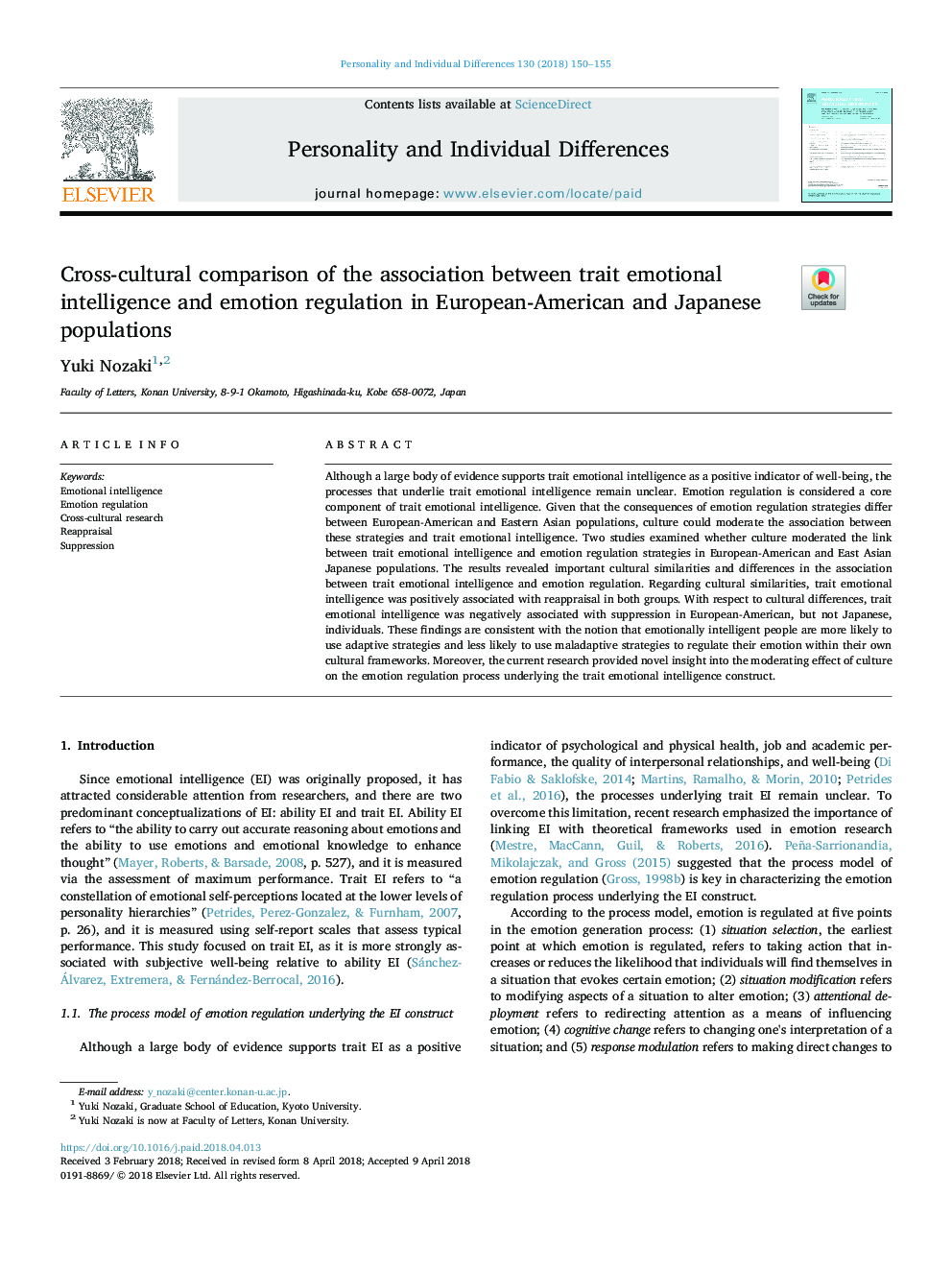| کد مقاله | کد نشریه | سال انتشار | مقاله انگلیسی | نسخه تمام متن |
|---|---|---|---|---|
| 7248673 | 1471988 | 2018 | 6 صفحه PDF | دانلود رایگان |
عنوان انگلیسی مقاله ISI
Cross-cultural comparison of the association between trait emotional intelligence and emotion regulation in European-American and Japanese populations
ترجمه فارسی عنوان
مقایسه بین فرهنگی ارتباط بین هوش هیجانی صفتی و مقررات عاطفی در جمعیت اروپایی-آمریکایی و ژاپنی
دانلود مقاله + سفارش ترجمه
دانلود مقاله ISI انگلیسی
رایگان برای ایرانیان
کلمات کلیدی
هوش هیجانی، مقررات احساسی، تحقیق متقابل فرهنگی، ارزیابی مجدد سرکوب،
ترجمه چکیده
اگرچه یک شواهد بزرگ از هوش عاطفی صوری به عنوان شاخصی مثبت از سلامتی حمایت می کند، اما فرایندهایی که هوش عاطفی را به اثبات می رسانند هنوز معلوم نیست. مقررات عاطفی جزء اصلی هوش عاطفی معنی است. با توجه به اینکه پیامدهای راهبردهای تنظیم احساسات در بین جمعیت اروپایی-آمریکایی و آسیای شرقی متفاوت است، فرهنگ می تواند ارتباط بین این استراتژی ها و هوش هیجانی را مشخص کند. دو مطالعه مورد بررسی قرار گرفت که آیا فرهنگ ارتباط بین هوش هیجانی صفات و راهبردهای تنظیم احساسات در جمعیت ژاپنی های اروپایی-آمریکا و شرق آسیا را تعدیل می کند. نتایج نشان داد که همبستگی های فرهنگی و تفاوت های مهم در ارتباط بین هوش هیجانی صفت و تنظیم عاطفی وجود دارد. با توجه به شباهت های فرهنگی، هوش هیجانی صفت با بررسی مجدد در هر دو گروه رابطه مثبت داشت. با توجه به تفاوت های فرهنگی، هوش هیجانی صفات منفی با سرکوب در آمریکایی های اروپایی-آمریکایی، اما نه ژاپنی، افراد مرتبط است. این یافته ها با مفهوم منطقی است که افراد هوشمند عاطفی بیشتر از استراتژی های انطباقی استفاده می کنند و احتمالا کمتر از استراتژی های ناسازگار برای تنظیم احساسات خود در چارچوب های فرهنگی خود استفاده می کنند. علاوه بر این، پژوهش حاضر، بینش جدیدی را در مورد اثر تعدیل کننده فرهنگ بر روند تنظیم مقابله با احساسات مبتنی بر ساختار هوش هیجانی نشان داد.
موضوعات مرتبط
علوم زیستی و بیوفناوری
علم عصب شناسی
علوم اعصاب رفتاری
چکیده انگلیسی
Although a large body of evidence supports trait emotional intelligence as a positive indicator of well-being, the processes that underlie trait emotional intelligence remain unclear. Emotion regulation is considered a core component of trait emotional intelligence. Given that the consequences of emotion regulation strategies differ between European-American and Eastern Asian populations, culture could moderate the association between these strategies and trait emotional intelligence. Two studies examined whether culture moderated the link between trait emotional intelligence and emotion regulation strategies in European-American and East Asian Japanese populations. The results revealed important cultural similarities and differences in the association between trait emotional intelligence and emotion regulation. Regarding cultural similarities, trait emotional intelligence was positively associated with reappraisal in both groups. With respect to cultural differences, trait emotional intelligence was negatively associated with suppression in European-American, but not Japanese, individuals. These findings are consistent with the notion that emotionally intelligent people are more likely to use adaptive strategies and less likely to use maladaptive strategies to regulate their emotion within their own cultural frameworks. Moreover, the current research provided novel insight into the moderating effect of culture on the emotion regulation process underlying the trait emotional intelligence construct.
ناشر
Database: Elsevier - ScienceDirect (ساینس دایرکت)
Journal: Personality and Individual Differences - Volume 130, 1 August 2018, Pages 150-155
Journal: Personality and Individual Differences - Volume 130, 1 August 2018, Pages 150-155
نویسندگان
Yuki Nozaki,
